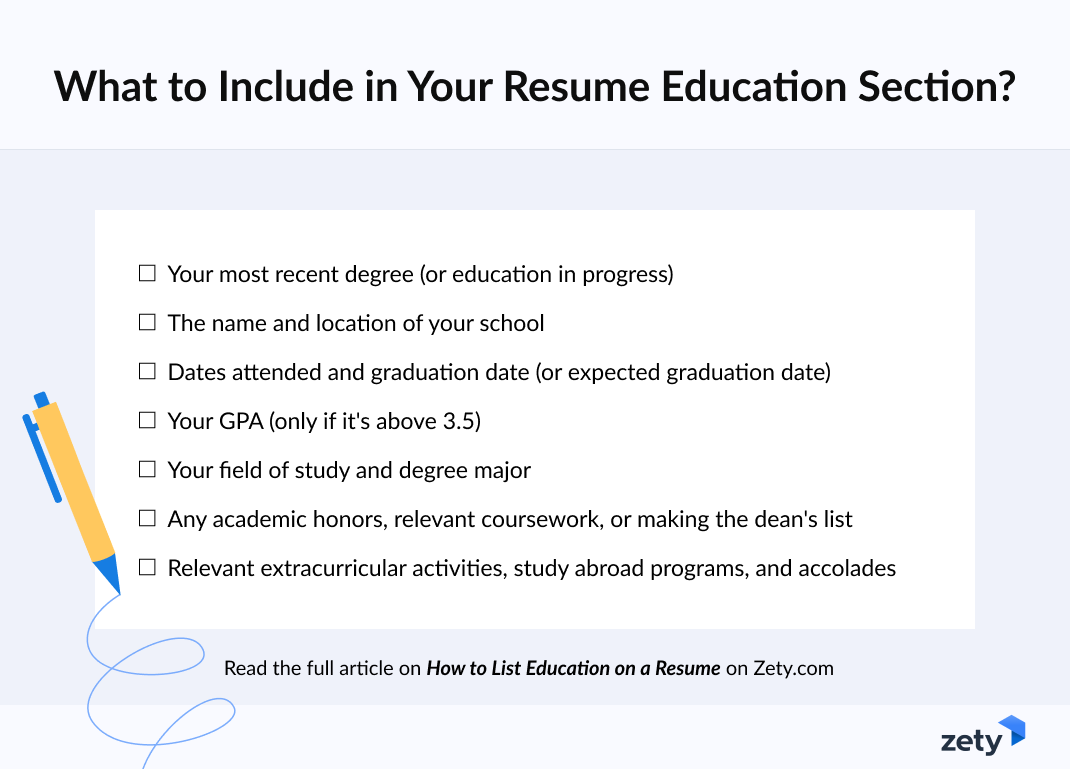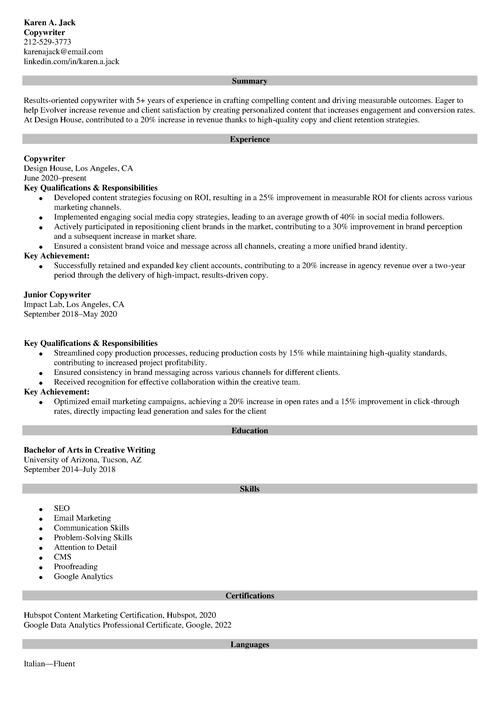How to put education on a resume? Creating a proper education section of a resume can surely boost your chances of getting hired. And that’s more valuable than getting an A!
Read on and find out everything you need to know about listing education on your resume.
This article will tell you how to put your education on a resume in every case:
- How to write education on a resume as a professional.
- Where should education go on a resume and what to put in an education section.
- How to list high school education on a resume, even if you never graduated.
- How to list education on a resume if you’re still in college, never graduated from college, or did graduate from college.
Want to save time and have your resume ready in 5 minutes? Try our resume builder. It’s fast and easy to use. Plus, you’ll get ready-made content to add with one click. Explore our free resume templates and start building your resume today.
Sample resume made with our builder—See more resume examples here.
After reviewing 11 million resumes created with our builder, we’ve collected valuable insights from users spanning different industries and levels of experience. Here are the top takeaways to help you design a more effective resume:
Data-Backed Insights From Actual Resumes
- 57.84% of resumes made with our builder are over 300 words, 28.23% are between 101 and 300 words, and 5.35% are under 100 words.
- 3.59% of our users have no work experience, while 28.86% report having less than 3 years of experience.
- Resumes typically list an average of 12.56 skills.
- On average, resumes include 2.61 previous jobs.
Were you looking for resume examples for jobs in education? See:
- Teacher Resume Examples
- English Teacher Resume Examples
- Special Education Teacher Resume Examples
- High School Teacher Resume Examples
- Elementary School Teacher Resume Examples
- ESL Teacher Resume Examples
- Music Teacher Resume Examples
- College Student Resume Examples
- College Graduate Resume Examples
- Resume Examples for All Jobs
1. Start with Essential Information on Your Educational Background
Let's start with the basics—what to include in your resume education section:
- Your most recent degree (or education in progress)
- The name of your school
- Location of your school
- Dates attended and graduation date (or expected graduation date)
- Your GPA (only if it's above 3.5)
- Your field of study and degree major
- Any academic honors, relevant coursework, or making the dean's list
- Relevant extracurricular activities, study abroad programs, and accolades
The information from the last two bullet points is an optional part of a resume education section, but more on that later.

The education section is just one part of a successful resume. Find out how to write a job-winning resume in our guide: How to Make a Resume in 2026
2. Select Relevant Info for Your Resume Education Section
For the most part, the education section of your resume is the easiest to write. Follow the tips below for a perfect resume education section.
If You're a Seasoned Professional
You can limit yourself to listing just the basic information about your highest level of education. There’s no need to delve too deeply into details like relevant coursework and so on.
43 million adult Americans have federal student loan debt. But what if you went to college and then realized that you didn’t want to join them and that $37,000 worth of the average student debt wasn’t for you? That doesn’t mean you can’t use what you completed.
You can still put unfinished college education on your resume. All you have to do is write in the credits you did manage to get. List your unfinished college education after high school education like this:
Education on a Resume: Example
Ohio State University, Columbus, OH
2005–2007 Completed 60 credits toward BA in Psychology
Cherryville High School, Cherryville, OH
Graduated in 2005
If you paid for it, it’s yours. If the coursework is relevant, you can put it on your resume.
If You're a College Graduate
Skip your high school education if you’re a college graduate. Listing education on a resume should not take long, as it’s usually the shortest resume section.
If you’ve got little to no work experience, including some extra details in your education section is a good idea:
- Awards and Honors
- Relevant Coursework
- Extracurricular Activities
- Academic Publications
If you’ve graduated from an honors program, graduated with the highest honors (magna cum laude or summa cum laude), or were the valedictorian or salutatorian of your class, put Latin honors on your resume next to your degree in your education section like in the example below:
Education on a Resume: Examples of Honors
Honors BS in Biology, Valedictorian, Magna Cum Laude
Purdue University, West Lafayette, IN
Graduated in 2012
Other honors and awards could include:
- Any academic award or scholarship.
- Academic honors besides being in an honors program, including making the Dean’s List or acceptance into honors societies (campus, national, or international).
You can make a separate Honors and Awards section if you feel that you have too many awards to list or want to draw special attention to them. The same goes for academic publications for Ph.D. students. You can either list your publications under your degree, or add a separate section if there are several you’d like to mention on your non-academic resume.
Also, if you have a degree in a different field, you can show that you took courses relevant to your professional field as well. For example, you’re applying for a job in marketing but have a degree in psychology. Did you take any business or communication classes? Those would be good to put in your coursework description.
Education on a Resume: Examples of Relevant Coursework
Bachelor of Arts in Psychology
The University of California, Berkeley, CA
September 2018–June 2022
- Relevant Coursework: Business Communication, Social Psychology, English Language Studies, Grammar and Editing
You can also list extracurricular roles if you’ve graduated within the last three years and need to flesh out your resume. Just avoid adding anything controversial (political or religious).
Want to include a different kind of education on your resume? This guide will help you out: How to List Continuing Education on a Resume
If You're a Student
And what if your higher education is still in progress? Put it on your resume like this:
How to List Ongoing Education on a Resume (Example)
BA in English Literature in Progress
Sarah Lawrence College, Bronxville, NY
Here is a handy list of phrases you can use to describe degrees that are still in progress:
- In progress
- Anticipated + date
- Expected + date
- Expected Graduation + date
- To be completed + date
Remember that the length of a student's resume should be short and not exceed one page. Adding sections (e.g., Hobbies and Interests) can be great if you're struggling to fill up space. But don’t add so much extra information to your resume that your resume spills over onto a second page.
A coursework description is another nice thing to add to a student's resume. Make sure that you choose courses that are relevant to the job for which you are applying.
Here is a list of skills employers like to see on student resumes:
If you participated in any activity that would highlight these skills (or took part in a study abroad program), you can add it to your education section, like in the following example:
How to List Current Education on a Resume: Example
Bachelor of Arts in Psychology
The University of California, Berkeley, CA
Expected graduation in 2025
- Relevant Coursework: Business Communication, Social Psychology, English Language Studies, Grammar and Editing
- Extracurricular Activities: Captain of the Lacrosse Team
When considering what should you include on a student resume, stick to things that show off your skills and achievements. That can range from honors, awards, and extracurricular activities to any work you had during high school. You’ll want to tailor your resume to the job description. So, pick activities that will illustrate the keyword skills listed there.
Making a resume with our builder is incredibly simple. Follow our step-by-step guide, use ready-made content tailored to your job and have a resume ready in minutes.
Don't overlook the value of including online courses or certifications in your resume's education section. Platforms like Coursera or LinkedIn Learning offer industry-relevant courses that can demonstrate your proactive approach to professional development. Highlighting these can be particularly beneficial if they align closely with the job you're applying for, showcasing your dedication to continuous learning and staying current in your field.
When you’re done, Zety’s resume builder will score your resume and our ATS resume checker will tell you exactly how to make it better.
3. Format Your Resume Education Section Properly
Now that you know what the education section of a resume must include, let’s talk about the formatting. Make sure that the way you format the entries in your education section remains consistent. It will make for a visually pleasing resume. Always put your highest degree first and add all other degrees in reverse chronological order.
You can format the education section of your resume like in the example below:
Education on a Resume Example
Education
2009 MA in English Literature
Harvard University, Cambridge, MA
3.7 GPA
2007 BA in English Literature
University of Pennsylvania, Philadelphia, PA
4.0 GPA
However, you don’t have to use this exact resume education section format. Remember that:
- You can either spell out your degree: “Master of Arts” or just use the initials “MA.”
- You can either use periods to separate initials: “M.A.”, or not: “MA.”
- You can write out the name of your major, “MA in Psychology,” or simply separate your degree from your major with a comma: “MA, Psychology.”
- You can order the information in various ways.
For example, the candidate above graduated from Harvard. As a literature major, she may feel like her degree isn’t directly related to the job for which she’s applying. That can happen when you’re an English major.
In that case, she may want to lead with the fact that she attended Harvard:
Listing Education on a Resume (Sample)
Harvard University, Cambridge, MA
MA in English Literature
Graduated in 2009 with a 3.7 GPA
For most of you, putting your education on your resume is that straightforward. If you want to add extra information, you can.
Pro Tip: Putting a GPA on a resume is optional. You should only add it if you graduated within the last three years and if it was above 3.50. Otherwise, lose it. Most hiring managers won’t care what your GPA is.
4. Consider the Best Spot for Education on a Resume
If you are a seasoned professional, put your professional work history section before your education. Hiring managers will find your work experience much more relevant at this point in your career.
Put your education above your work history if you're a student or recent graduate with little experience. If you have over a year of work experience, your education should come after your employment history. Don't forget about relevant coursework, honors, and making the dean's list.
In most cases, resumes open with the work experience section, as it's more relevant and important to recruiters. But there's nothing wrong with breaking this rule if your education is much more impressive than your experience.
Education goes above work experience, too, when you're writing an academic CV. For academic posts or fellowships, your education matters way more than your experience outside of academia.
Pro Tip: If you want to save time and find out how to write a great resume for your profession, take a look at our guides and examples of resumes here.
Plus, a great cover letter that matches your resume will give you an advantage over other candidates. You can write it in our cover letter builder here. Here's what it may look like:
See more cover letter templates and start writing.
Key Takeaway
The thing to remember is that there are no hard and fast rules about how to add education to your resume:
- You can put your education section before or after your work experience section.
- You can add as much or as little information as you need.
- For students, your education section can do the heavy lifting until you’ve gained enough professional experience.
- Even if you didn’t finish a degree, the courses you did finish are yours to put on your resume.
Think of your education section as an opportunity to position yourself ahead of the rest.
About Zety’s Editorial Process
This article has been reviewed by our editorial team to make sure it follows Zety's editorial guidelines. We’re committed to sharing our expertise and giving you trustworthy career advice tailored to your needs. High-quality content is what brings over 40 million readers to our site every year. But we don't stop there. Our team conducts original research to understand the job market better, and we pride ourselves on being quoted by top universities and prime media outlets from around the world.


![How to List Education on a Resume [+ Examples]](https://cdn-images.zety.com/pages/education_on_resume_zety_us_cta_2.jpg)


